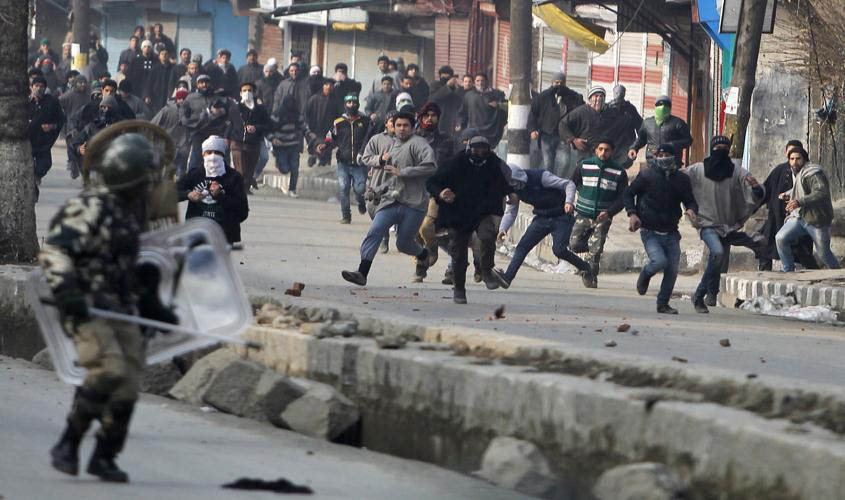Kashmir is on the boil for the last two summers as some Kashmiris wage their so-called “war of independence”. The situation raises certain questions about their real intentions. Questions such as, is India an occupying power obstructing the social and economic development of Kashmiris? Is India hurting their religious sensibilities? Is India stopping Kashmiris from going to schools, colleges and universities? Is India restricting the growth of jobs, businesses, trade and industry in Kashmir? Is India inducting outsiders to state government services there? Will Kashmiris, by becoming a part of Pakistan, have better schools and colleges or better opportunities for jobs, trade and business, or better infrastructure? The answer to all these questions is “no”. These issues have neither been raised by any separatist groups nor has Pakistan promised a better life for Kashmiris.
The truth is, a section of Kashmiris want independence only because they are Muslims and do not want to live in “Hindu India”. If this is not communalism at its worst, what is? Pakistan is extending “moral and diplomatic” (obfuscation for terrorist hardware and psychological training) support to these Kashmiris because they are Muslims and should be part of an Islamic republic, which is Pakistan. For India, the real question is whether it can afford to allow a minuscule 8 million minority living in a small part of the country to separate from India. For 200 million Indian Muslims, won’t that be a bigger disaster than the formation of Pakistan?
Some Muslim religious parties, instead of pacifying their brethren in Kashmir, internally gloat over the troubled situation there. One such party is Jamaat-e Islami-Hind (JeI), which includes in its purview only the rest of India minus Kashmir, as it does not recognise Kashmir as a part of India. The Hizbul Mujahideen (HM), the main terrorist organisation active in J&K, owes its allegiance to JeI Kashmir and regularly consults it. Kashmiri Muslims, 90% of whom follow Sufi traditions, have been made subservient to JeI’s Salafist ideology. The fear of Salafists is so deep that even Shia Muslims obey their diktat. In Kashmir, it is not a genuine war of independence, but an attempt by Salafi jihadi communal forces to destabilise the state.
The communal agenda of the pro-Pakistan elements in Kashmir got a fillip with the 2014 Assembly elections, which saw the formation of an “unnatural” coalition government comprising a pro-Hindutva BJP and a soft separatist PDP. Immediately on coming to power, PDP started acting on the agenda of appeasing the pro-Pakistan lobby, especially by releasing their people from jail. This provided an opportunity to our so-called “secular” parties and the media to taunt the Narendra Modi government for joining hands with the pro-separatist PDP. It’s another matter that both National Conference and Congress were more than eager to extend their support to the PDP, to keep the BJP out of the J&K government.
A large section of the English media has been exacerbating the communal divide in Kashmir by taunting the BJP and the PDP for entering into a coalition. Mischievous antics such as mobs carrying Pakistani and ISIS flags—not a single Kashmiri has joined ISIS—were given exaggerated publicity, with the deliberate intention of provoking the Central government and the state BJP. A top female journalist projected a larger than life image of Burhan Wani, a HM militant, turning him into a hero for Kashmir. This section of the media cannot escape its share of the blame for the deteriorating situation in the valley.
Also, Pakistan’s failure to make India restart the dialogue process has made it intensify the violence in Kashmir through proxies such as HM, LeT and JeM.
Bluntly speaking, I don’t see an early end to the disturbance in Kashmir, which, to some extent, is also due to our own mishandling of the situation. No amount of talking or any initiative is likely to improve the situation in the short term. This is a communal situation and has to be dealt firmly like any other communal situation is dealt with.
The Opposition too needs to forsake its doublespeak on Kashmir and stop showing sympathy towards communal and pro-Pakistani elements in the name of secularism. Their stance will prove counter-productive for them politically, in the rest of India, as people view such approach as pandering to Kashmir’s communalists and terrorists.
India is neither an African banana republic nor a Balkan state, that world powers will send their soldiers to “liberate” Kashmir just because there is prolonged disturbance there. Pakistan too cannot dare to start a regular war with India over Kashmir. India is a country big enough to take some unfortunate losses in its stride, although the ruling party must understand that the repercussions of “Dadri and Alwar” or cow vigilantes or beef ban or hooliganism by Hindu rightists do not remain confined to the heartland, but also spoils the situation in Kashmir. The political parties and the media too must restrain themselves from adding fuel to the fire. The current situation can be made normal only by tiring out the rioters and terrorists over a prolonged period, through a restrained but strong handling of the situation, coupled with sincere economic initiatives in the state.
Rajinder Kumar is a former Special Director of Intelligence Bureau.

